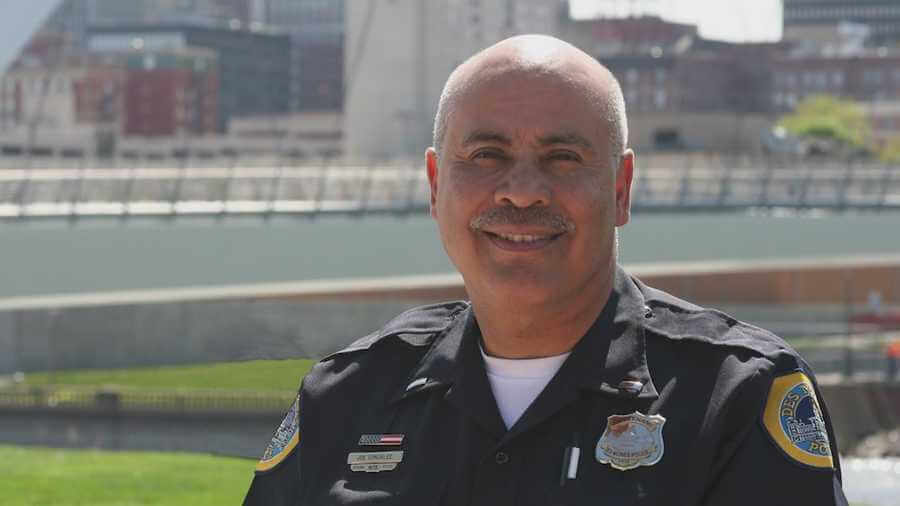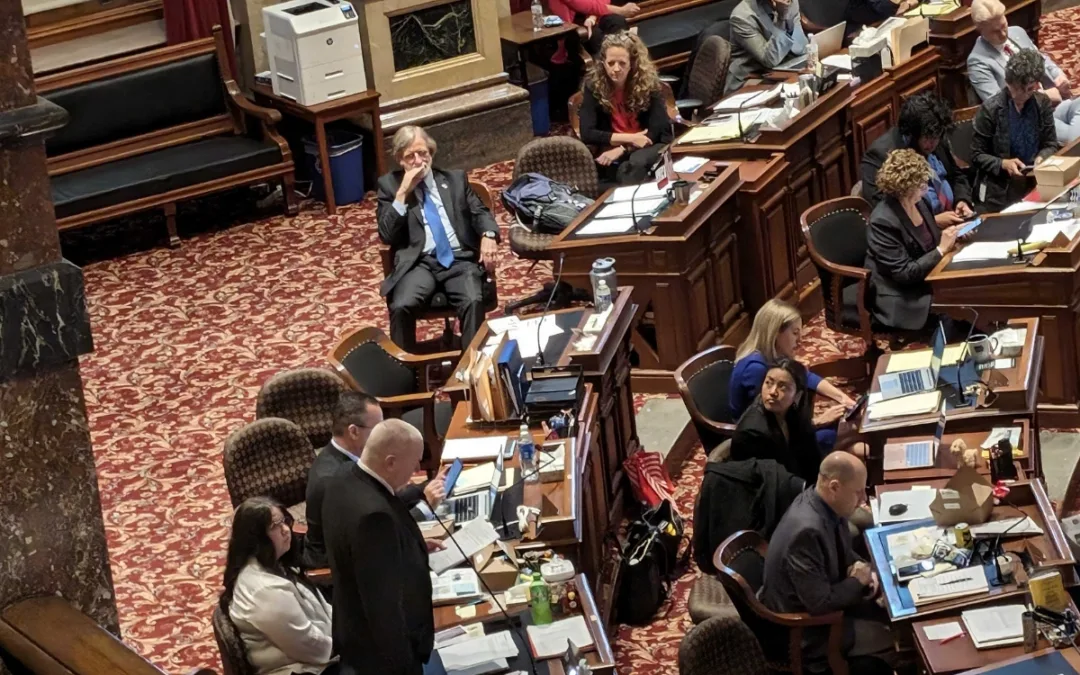
Photo via DMPD
I will never forget the movie “Fields of Dreams” and its popular quote: “build it and they will come.”
It may sound cliché, but it is true; when you build community, people gravitate toward that community or the persons who make that community great, regardless of your circumstances.
This was true for me when I arrived in Des Moines in 2000. One of the first pieces of sound advice I received was, “You need to meet officer Joe Gonzalez, he is always there to help the community.” Officer Gonzalez is an immigrant, too, born in Michoacán, Mexico. He understands what it is to be a newcomer. He knows his community, its needs, and is always willing to help.
Gonzalez immigrated to Iowa in 1957 when he was 5, along with his mother and two younger brothers. Like many Iowa immigrant stories of the time, his family followed his father who came to work on the railroad. They were looking for a better life.
“Everything was easier at that time. Getting documents was not as difficult as it is now,” Gonzalez said.
[inline-ad id=”1″]
Back then, most Latinos lived in Valley Junction and on the South Side of Des Moines.
Looking back, he recognized the move must have been hard for his mother, but for a young kid, it was an adventure. Everything was new, shiny and pretty. Going to school and learning a new language wasn’t hard. He interpreted English for his parents when they needed it.
In the early ’70s, after the civil rights movement, the Des Moines Police Department started a special program to hire people of color and women. Gonzalez was in high school and had taken a criminal justice class, which sparked his interest in becoming a police officer.
He started working for DMPD in 1971 when he was only 18. There was another Latino officer when Gonzalez joined, but he then left his position, leaving Gonzalez the sole Latino officer in the department for many years.
[inline-ad id=”0″]
He recalled that when the new female officers or officers of color responded to calls, non-minority residents would sometimes refuse to talk to them, demanding to talk to a white male officer. The department would respond by saying the public had to respect all officers. The rejection of female officers was also an internal issue in the department; older officers believed women didn’t belong there.
When asked how he managed life as a Latino in law enforcement, Gonzalez said: “People will always have unconscious bias, but regardless of what they thought about me, I always treated everyone with respect.”
The demographics of Des Moines began to change with Latino residents becoming the fastest growing minority. In 2000, the police chief created the HONRA program (Hispanic Outreach Neighborhood Resource Advocate), which Gonzalez would go on to lead.
“Latinos won’t report crimes. They were living in the shadows because of the lack of proper documentation to be in the country. They wouldn’t call the police because they believed the police would call immigration and arrest them. They believed they had no rights, so I started knocking on doors, going to their houses and businesses to talk to them, assuring them that the police was there to help them, not to harm them,” Gonzalez said.
[inline-ad id=”2″]
In addition to helping Latinos trust the police, Gonzalez also talked to his fellow officers about treating Latinos with respect.
“Even now, people think that being undocumented is a crime, which is not true, it is an administrative offense, and therefore many try to take advantage of Latinos, threatening with calling immigration if they report a crime or a criminal.”
Gonzalez fully understands the importance of the Latino community and what they bring to the city and the country, regardless of their legal status. Latinos contribute to the economy by paying taxes, filling jobs and making the city an attractive and vibrant place for Latinos and non-Latinos.
Although Joe retired from the police department in 2014, he continues to be involved with the Latino community, acting as an Executive Director of the Latino Heritage Festival.
It was inevitable to discuss the current political environment with Gonzalez. After all, Iowa is the center of politics right now.
[signup_form]
He expressed a great deal of concern that the Latino community has been deeply affected by President Trump’s hateful rhetoric.
“Our people are afraid. They are afraid to go to work and send their kids to school,” he said.
Prior to Trump’s election, Gonzalez said he always respected the president, regardless of their political party and differing beliefs. Now, he can’t say “that’s my president.”
“What’s happening is a tragedy. It’s a shame what’s happening right now with this administration,” Gonzalez said, decrying how Trump pushes away U.S. allies while drawing closer to enemies, like Russia and North Korea.
[inline-ad id=”3″]
Gonzalez looks forward to the Iowa Caucuses, noting his support for Sen. Elizabeth Warren, Mayor Pete Buttigieg and former Vice President Joe Biden. He said the country needs a president who can unify the nation because it is extremely divided. The candidate must be inclusive, treat everyone the same, and continue to fight for a common cause, he said.
Gonzalez is respected and admired by Latinos, non-Latinos, politicians, workers, teachers, and fellow officers. He embodies what we know as a Latino icon.
We were sad to learn he was not interested in running for office at this time, because what we need are leaders like him; leaders with integrity, always helpful, and with human decency.
We will be waiting anxiously for him to change his mind.
By Claudia Thrane
Posted 12/11/19
Politics

AEAs cutting workers in wake of Republican legislation
Iowa legislators said a new bill cutting money for agencies that help students with disabilities wouldn't affect services. But area education...

He said what? 10 things to know about RFK Jr.
The Kennedy family has long been considered “Democratic royalty.” But Robert F. Kennedy, Jr.—son of Robert F. Kennedy, who was assassinated while...
Local News

No more Kum & Go? New owner Maverik of Utah retiring famous brand
Will Kum & Go have come and gone by next year? One new report claims that's the plan by the store's new owners. The Iowa-based convenience store...

Here’s a recap of the biggest headlines Iowa celebs made In 2023
For these famous Iowans, 2023 was a year of controversy, career highlights, and full-circle moments. Here’s how 2023 went for the following Iowans:...




